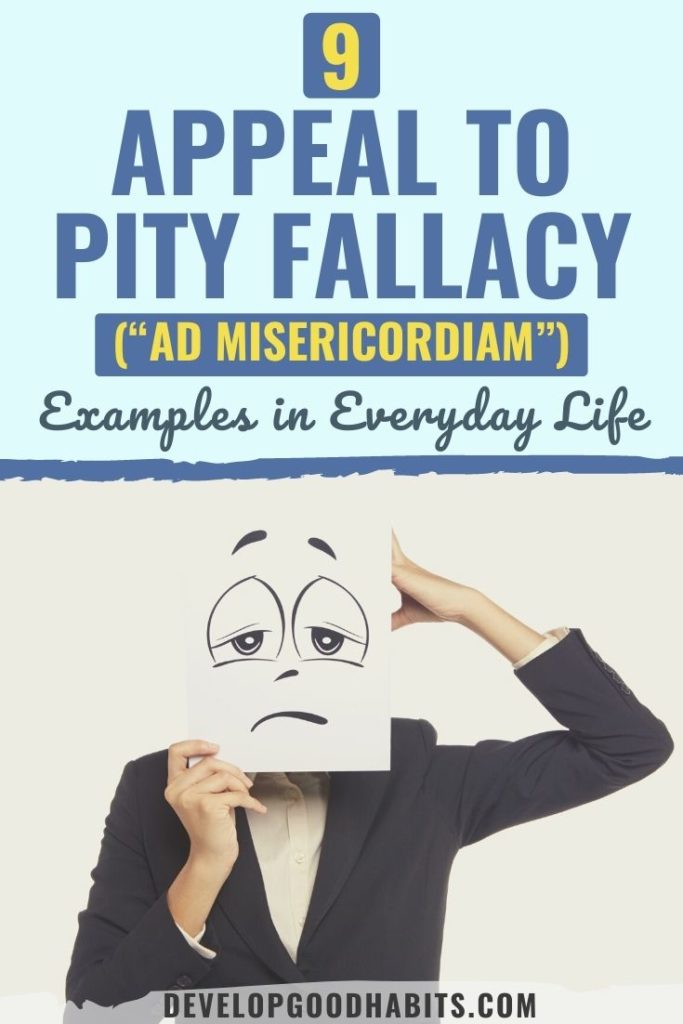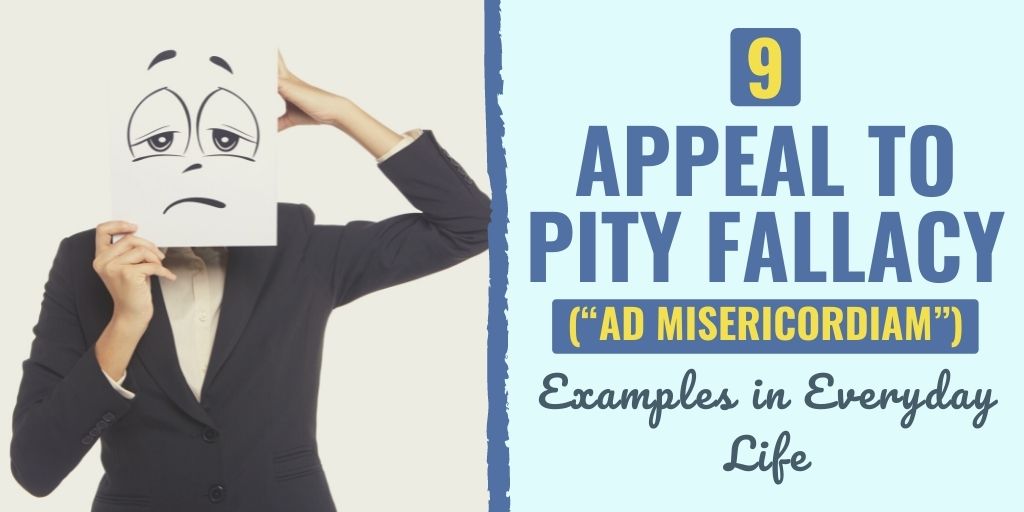If you’re trying to prove something is true, what is the first thing you look for?
I think it’s fair that most people would say that evidence or facts is where they start when searching for the truth.
But, if you can’t find any evidence, where do you go next?
You may give up and conclude that whatever you’re trying to prove isn’t, in fact, true. But what if you’re the one trying to prove something to someone else and you just know it’s true?
This is one type of conversation in which the appeal to pity fallacy often comes up. This type of fallacy makes an emotional appeal by manipulating someone into doing or believing something by making them feel an emotion such as fear, joy, or pity. (See more examples of this appeal to emotion logical fallacy in this post.)
In this article, we will look at a more in-depth definition of an appeal to pity (otherwise known as “ad misericordiam”) as well as 9 examples of when you may come across this logical fallacy in your everyday life.
Let’s get started.
What Is an Appeal to Pity?
Traditionally recognized as the Ad Misericordiam fallacy, an appeal to pity is an illogical pattern of reasoning that tries to influence other people through an emotional plea. In the world of logical fallacies, this one falls under the “red herring” category.
This tactic is often used by people who have a lack of evidence to support their claim in an attempt to distract people’s attention away from the actual premise of the argument.
This logical fallacy can be successfully executed because in most instances, people want to reduce human suffering as much as possible when making decisions. We don’t want to hurt each other or see people suffer through life, so we act accordingly. Think about the following issues:
Or consider how quickly the American Red Cross and other organizations jump into action after a natural disaster. We’re all concerned with human suffering in some way for a variety of reasons:
All this to say, we all lie somewhere on a spectrum of caring about other people, with the vast majority of the population landing relatively high on the spectrum.
Because of this, we often make decisions with human suffering in mind–we want to reason well in order to alleviate discomfort. And the more compassionate someone feels, the more likely they are to act on this emotional type of reasoning.
Enter the appeal to pity fallacy.
People who take this route in an argument are attempting to make people feel bad for something or someone in order to make them act in a certain way that will benefit the person making the claim.
Let’s take a look at some examples that may sound familiar from everyday life.
9 Appeal to Pity Fallacy (“Ad Misericordiam”) Examples in Everyday Life
1. “Teacher, I deserve the F I received on this exam to be dropped because I was sick the weekend before the exam and my dog died and I got in a car accident, so I couldn’t study that much.”
In this case, the student is making an irrelevant argument in an attempt to make the teacher feel sorry for him. The truth is, the student should have been studying all along rather than leaving everything until the last minute, which means his recent series of bad luck shouldn’t have resulted in a failing grade. And, if his circumstances were really dire, he should have asked for an extension on the exam before taking it.
Students may resort to this plea if they’re unable to present any relevant facts supporting their argument for a higher grade. However, if teachers fell for the appeal to pity fallacy, there would be a lot more straight A students out there.
2. “You should not find the defendant guilty because he has children who need their daddy.”
It’s true that a lot of families are left without a father due to incarceration, and this has very strong negative impacts on the children in the long-run. However, does having children mean that people should be spared from incarceration as a result of their crimes?
The negative impacts that parental incarceration has on children should be taken into consideration prior to a crime being committed. Once a case goes to trial, the fact that the defendant has children is irrelevant to their criminal charges. So, in this case, the person making the argument is evading the pertinent facts and making an appeal that is purely based on emotions.
3. Appeal to Pity In the Medical Profession
In his book, Critical Thinking for Addiction Professionals, Michael Taleff offers an example of an appeal to pity that medical professionals often face, especially those who work in the field of addiction.
In his studies, he found that medical professionals who work in inpatient drug detoxification programs frequently interact with patients who are pleading for opioid narcotics to soothe unsubstantiated pain. Or, they’re begging for mood-altering medication to “reduce uncomfortable withdrawal symptoms” long after the withdrawal period has passed.
Because some medical personnel find it difficult to say no to someone who appears to be suffering, prescription medications are sometimes dispensed to patients who are working to overcome their addiction to that exact medication, resulting in a relapse.
In these cases, patients are convincing medical staff who recognize the emotions of their patients as being sufficient compelling evidence to make the decision to dispense a medication. This means that the staff in these cases are being manipulated by someone appealing to their emotions.
4. “You should hire me because I really need the money to support my family.”
There are plenty of people in the world who need to work in order to support their family, so this is not a reason to hire someone. Hiring managers are looking for those who are right for the job with relevant qualifications, education, and experience.

Claiming you’re the best candidate because of your own needs may make someone feel sorry for you if your situation is extreme, but it’s not likely to be persuasive enough for them to invest in your skills unless they’re related and suitable for the position.
5. Asking For Contributions
You’ve probably seen advertisements on television that depict starving children living in extreme poverty in third world countries. These commercials often ask for a monthly contribution to help alleviate the suffering of the children pictured in their 60-second appeal to solicit your donation.
Appeals such as these can lose their credibility when shown to a logical audience because they fail to address the cost of the donation (i.e. how much of your money will go directly toward helping the children and how much will be paying for the advertisement that you’re watching) or the demonstrated effectiveness of their program.
Rather, this argument is relying solely on emotional appeals. And, when coupled with emotive language, a listener’s rational response is decreased and they’re encouraged to act instinctively on their emotions. Some examples of emotive language in this case would be:
Words such as these can change the feel of an argument and evoke an emotional reaction.
6. In the Media
I recently watched The Circle and noticed an appeal to pity fallacy when the main character, Mae, is talking to a co-worker at a party. Their exchange (which begins at 39:20 in the movie) ends like this:
Co-worker: Right now, I’m working on Child Track. The program protects children from predators. The second a kid isn’t where they’re supposed to be, an alert goes off, and the kid can be tracked down within 90 seconds.
Mae: Wow. Do they wear a bracelet or…?
Co-worker: We place chips in their bones.
Mae: [Breaks out laughing]
Co-worker: [Looks at Mae with a harsh expression]
Mae: You’re…you’re serious?
Co-worker: I’m serious about immediately reducing kidnapping, rape, and murder by 99%.
Mae responds to this with a look of agreement, as if to say, “oh, of course we want to keep children safe.”
In this example, the co-worker didn’t have any hard evidence that this program will work, rather she is suggesting that they’re going to try to pay the physical cost of placing the chip into children’s bones and have children sacrifice their independence for this program with the hopes that it will reduce child abductions by 99%. She’s making an appeal to pity by implying that Mae should share her concern about children’s safety, which Mae then acknowledges.
7. “Officer, please don’t give me a ticket, I was rushing home to help my spouse care for our sick child.”
While I would probably also be speeding home in this situation, the excuse for speeding is irrelevant to the fact that the person was breaking the law. Therefore, trying to make the police officer feel sorry for him because he has a sick child at home probably won’t give the officer good enough reason to spare him a speeding ticket.
In this example, the appeal to pity isn’t necessarily irrational or fallacious, the issue lies in the fact that the impact of the appeal could carry an emotional burden that’s much greater than the current dialogue merits and distract the respondent from the relevant considerations at hand. When an appeal such as this is made fallaciously, it can trick other people into making decisions that they shouldn’t.
For example, let’s say the above example was changed to, “Officer, please don’t give me a ticket, I’m rushing to the hospital because my child is on his deathbed and has less than an hour to live.”
If this were used as an excuse and wasn’t actually true, it would be an appeal to pity in the form of a fallacious argument, and the fact that the officer is left to make his own judgement call is where being on the receiving end of this type of argument can be problematic.
8. “Schools should give easier tests because teachers don’t understand the extent of the emotional pain students feel when they receive a bad grade.”
Studies have shown that failing grades are linked with depression. However, this doesn’t necessarily mean that failing tests is the direct cause of symptoms of depression.

Making the argument that students are feeling emotional pain and should therefore be challenged less in school is a fallacious argument, as there are other factors likely involved in adolescent emotions. Furthermore, the challenging aspect of tests is important to help students learn and prepare themselves for real-world careers down the road.
9. “I should not face consequences for the complaints filed against me for sexual harassment. I am a well-known athlete who is creating a great reputation for this school.”
In this case, the speaker is trying to manipulate people’s feelings in order to avoid punishment. However, the pity that one may feel for the speaker or the feelings that one has about the reputation of the school’s sports program is irrelevant to the speaker’s circumstances.
Instead of presenting a valid argument with evidence that he did not engage in sexual harassment, the athlete falls back on trying to evoke emotion in his audience to convince them he should not be punished.
Final Thoughts on the Appeal to Pity Fallacy
Appeals to pity can be very powerful. When you invoke sympathy in your audience, you’re inviting them to identify with what you’re saying on a visceral level, letting go of any intellectual filters that they may usually use, such as uncertainty and logic.
Using this type of argument can be unethical if you don’t allow your listeners to rationally consider your argument before determining how to proceed without any emotions involved. Because of this, it’s important to avoid pity when trying to make a claim. Furthermore, this tactic will demonstrate to any logical thinkers that you’re lacking concrete evidence for your argument.
See More Logical Fallacy Examples
- 5 Appeal to Nature Fallacy Examples in Media and Life
- 6 Outcome Bias Examples That Can Negatively Impact Your Decisions
- 7 Self-Serving Bias Examples You See Throughout Life
- 7 Omission Bias Examples That Negatively Impact Your Life
- 6 Authority Bias Examples That Might Impact Your Decisions
- 5 Burden of Proof Fallacy Examples
- 5 Appeal to Tradition Fallacy Examples in Life
- 5 Appeal to Authority Logical Fallacy Examples
- 7 False Cause Fallacy Examples
- 7 Appeal to Ignorance Fallacy Examples
- 7 Appeal to Common Sense Logical Fallacy Examples
- 5 Post Hoc Fallacy Examples (and How to Respond to This Argument)
- Gambler’s Fallacy: 5 Examples and How to Avoid It
- 5 Appeal to Anger Fallacy Examples Throughout Life
- 7 Halo Effect Bias Examples in Your Daily Life
- 7 Poisoning the Well Examples Throughout Your Life
- 7 Survivorship Bias Examples You See in the Real World
- 7 Dunning Kruger Effect Examples in Your Life
- 7 Either Or (“False Dilemma”) Fallacy Examples in Real Life
- 5 Cui Bono Fallacy Examples to Find Out “Who Will Benefit”
- 6 Anchoring Bias Examples That Impact Your Decisions
- 7 Virtue Signaling Examples in Everyday Life
- 7 Cherry Picking Fallacy Examples for When People Ignore Evidence
- 9 Circular Reasoning Examples (or “Begging the Question”) in Everyday Life
- 9 Loaded Question Fallacy Examples in Life and Media
- 9 Confirmation Bias Fallacy Examples In Everyday Life
- 9 Bandwagon Fallacy Examples to Prevent Poor Decisions
- 5 Red Herring Fallacy Examples to Fight Irrelevant Information
- 9 Middle Ground Fallacy Examples to Spot During an Argument
- 5 False Equivalence Examples to Know Before Your Next Argument
- 7 Hasty Generalization Fallacy Examples & How to Respond to Them
- 6 Straw Man Fallacy Examples & How You Can Respond
- 6 False Dichotomy Examples & How to Counter Them
- 7 Slippery Slope Fallacy Examples (And How to Counter Them)
- What is the Planning Fallacy?
- How to Overcome the “Sunk Cost Fallacy” Mindset
Finally, if you want a simple process to counter the logical fallacies and cognitive biases you encounter in life, then follow this 7-step process to develop the critical thinking skills habit.

Connie Mathers is a professional editor and freelance writer. She holds a Bachelor's Degree in Marketing and a Master’s Degree in Social Work. When she is not writing, Connie is either spending time with her daughter and two dogs, running, or working at her full-time job as a social worker in Richmond, VA.


